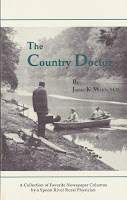In this episode, Doc Welch . . .
Many authors have characterized life in rural Illinois over the years. Among the more notables are Edgar Lee Masters, who wrote Spoon River Anthology, Carl Sandburg for his poetry and biography of Abraham Lincoln, and little known to me until recently, my first doctor, whom everyone in town always called Doc Welch - James K. Welch, M.D. (Feb. 7, 1915, to May 5, 1998)
While exploring the microfilm of the Cuba Journal (published from 1884 to 1992), I consistently kept running across articles entitled The Country Doctor. This intrigued me.
Doc Welch was a third-generation practicing Country Doctor in Cuba for over 40 years. His father, James William Welch, M.D., practiced medicine in Cuba for more than five decades. His grandfather, James Knox Welch, M.D., settled in Cuba after the Civil War.
There are beautiful old houses I remember as a young boy that today stand vacant; windows were broken out and collapsing. It's disheartening. I never witnessed the decay; it was 1976 when I moved to Macomb to attend Western Illinois University. From there, I moved to California.
As we mentioned in a previous podcast Our Town, my memories of that thriving community are of days gone by; Day & Palins, the grocer, one of my first jobs as a stock boy. Two hardware stores; Marshall's Hardware; how could anyone forget Toy Land? And Gambles, where we bought my first Sting-Ray bicycle. Cuba Motors, the local Ford dealer. The Cuba Department Store, with its optimistic clerk Doby Lemons. Two barbershops; Ed Huggins, Cardinals fan, and Cocky Lyons, Cubs fan. Ben Franklin Five and Dime. Cox's Corner, the local sundries, where we bought comic books and enjoyed a Green River. Cuba Bank, my first savings account. The Cardinal Cafe, where I became a pinball wizard before my daily paper route while waiting for the papers to arrive. Emil's Market, the local butcher, the Post Office, where I learned to count change from its Postmaster, The Cuba Journal. And Doc Welch's office - "Say ah . . . drop your pants, now turn your head and cough."
While exploring microfilm of the Journal from 1963 to 1965, I caught myself reading a weekly column, The Country Doctor. For over 30 years, Doc Welch wrote articles for; The Cuba Journal, The Canton Daily Ledger, The Galesburg Post, and the Prairieland News Journal.
Curious, with the advent of the internet, how many young people use the library for reading pleasure and research these days? Not many, it seems; there were three people there during my two-day research. They were playing games on the computers (there are three) available to patrons. For those who make it home for the holidays, library hours are from 9:30-4:00 daily. They have free WiFi.
Previously my depiction of this community was that of citizens who live to hunt. Some would say it is an idyllic lifestyle, while others find it boring. Neither is accurate, for the town's character changes with its people, time, place, and the observer's perspective.
During this visit, we happened to pick up a copy of Doc's book, The Country Doctor, published in 1996. It is a collection of his favorite newspaper columns from 30 years of articles. Doc's perspective is a refreshing one. In his essay - Coal Mining - he writes, "This erosion of industries and jobs is a melancholy example of what happened to rural America. My wife and I watched with distress, but we never wavered from our belief that the rural environment was the best one to raise our six children. We also believe rural society will rise again and that it could be a model to remedy many of America's current insanities."
Being a product of the rural community myself, I couldn't agree more. The question that keeps coming to my mind is, what catalyst will rejuvenate small communities like Cuba? Is it education? Could it be e-business? Is it volunteers? Maybe it's you and me. Think about it.
According to LaVonne A. Straub, Ph.D., professor of Economics at Western Illinois University, "The country doctor does not treat patients with laser precision that hones in on "the problem"; rather, it is with an approach that considers the whole patient - the person, the family, and the environment. To each, the doctor gives a part of himself in the process." Bravo!
Reading Doc Welch's book (my copy is well-thumbed) provides an enlightening perspective on what it means to grow up in a rural community. A deeper understanding of what is meant by "Midwest values" and a deep appreciation of the environment, friends, and the family you love.
If you do get a chance, take a look at The Country Doctor by James K. Welch, MD. It's available on Amazon.
I'm Patrick Ball; thanks for listening; see you in the next episode.

Comments